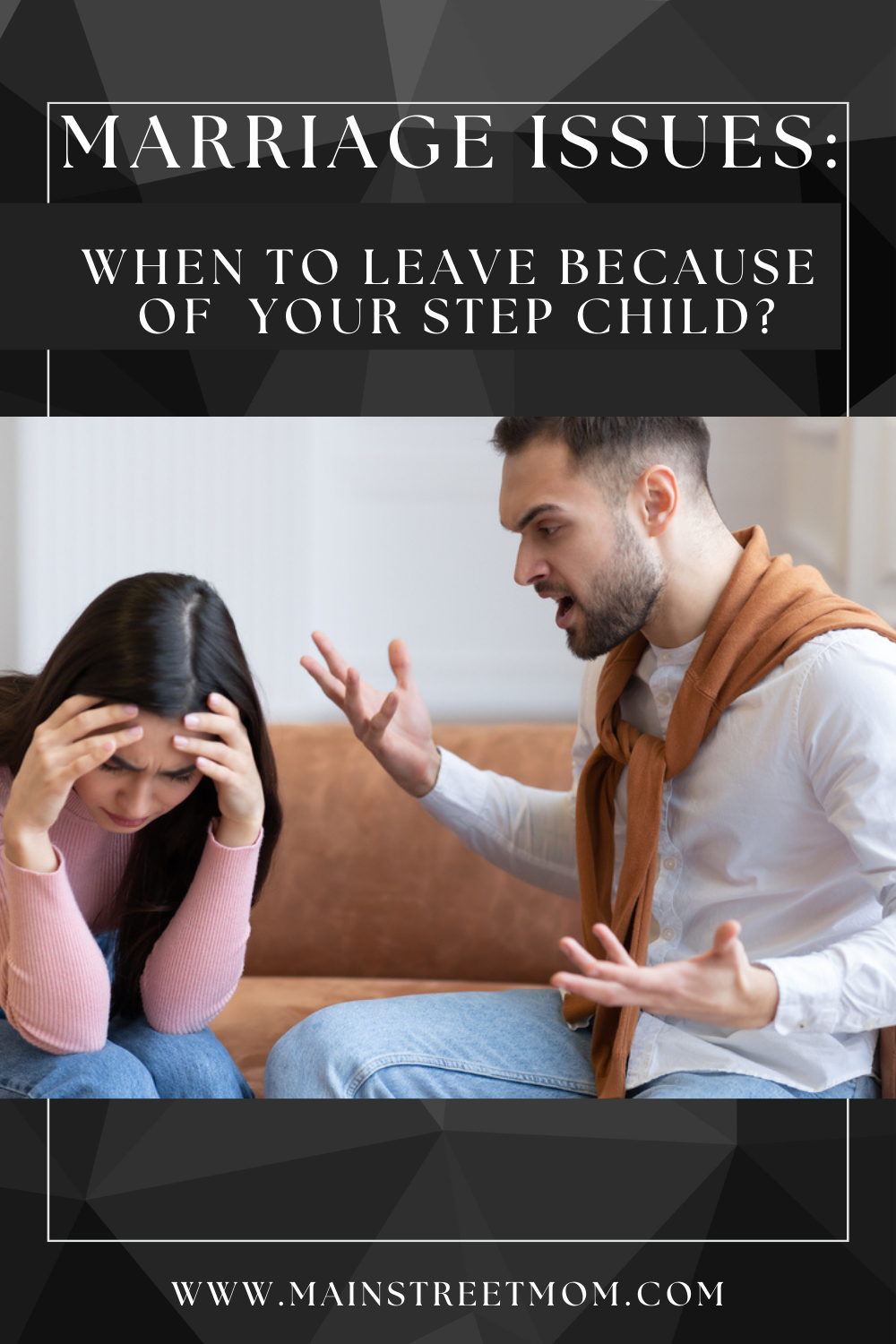How many times do you need to have heart-to-heart conversations with your blended family before you start wondering when to leave because of your stepchild?
How many times do you need to hear “You’re not my mom!” before you discuss the problem at hand with your partner? How many times do you need to cry over “I don’t have to listen to you!” before you understand you’re biting more than you can chew?
When you’re the parent of a blended family, these are the types of questions you wonder about on a regular.
Blended families are awkward for everyone because they’re a product of a series of fortunate events that bring two people who love each other together. But, they also bring a bunch of children (who often don’t know each other) together, too.
When everyone comes together, they suddenly create a whole new world of stepmothers, stepfathers, step-siblings, and step-grandparents. We know that sounds great on paper, but more often than not, the blended family goes through what we can only describe as growing pains.
While they’re merging together, they’re learning how to love each other, trust each other, and respect each other.
Sure, most families manage to overcome the differences and appreciate the crowded Christmas dinners and Sunday barbecues. However, there are times when not every member of the blended family accepts the changes.
Considering the fact you’re wondering when to leave because of your stepchild, chances are your stepchild hasn’t had the opportunity (or enough time) to accept what’s going on.
Even though there might be growing pains, differences of opinion, and learning opportunities, learning from each other’s mistakes and understanding each other’s perspectives should be a must. And, that’s why we’re covering when to leave because of your stepchild.
How do you decide when to leave because of your stepchild?

Stepchildren go through a lot when they’re expected to accept a new family, new siblings, and even a new environment without batting an eye.
And, when you’re wondering when to leave because of your stepchild, you should take a moment to reflect on what your stepchild had to go through before the two of you embarked on a problem you couldn’t solve.
Actually, when you’re the one who’s entering a blended family, you should never assume a blended family’s dynamics are the same as the dynamics of a regular, nuclear family.
Many parents make the mistake of thinking they don’t need to go through a period of acceptance and adaptation solely because they’ve had a family, and they’ve learned how to manage a family.
Blended families are different because there’s a lot of tension bubbling below the surface. So, no matter what your intentions might be, they’re guaranteed to come off as something completely different to a stepchild that’s trying to manage a whirlwind of emotions without anyone’s assistance.
On one hand, you should work with your partner to ensure both of you are on the same page, offer unreserved support to your stepchild, and manage the problems at hand with grace. On the other, you shouldn’t turn a blind eye when your stepchild displays one (or more) patterns of behavior we’ll discuss down below.
1. When your stepchild’s hurting your children

Before we tackle the fact that your stepchild might be hurting your children, we need to differentiate between sibling rivalry and actual sibling abuse. Competing between sibling’s pretty common, even when we’re talking about nuclear families rather than blended ones.
Children don’t have the mental and emotional capacity to understand such tremendous changes happening around them, and they might resort to violence when they don’t think they have a different choice to cope.
While you might want to wait a little longer to check whether your stepchild and your children get used to each other, you definitely shouldn’t wait for your stepchild to abuse your children.
Also, when we’re talking about the type of abuse that warrants you to leave the marriage, we’re not talking about harmless quarrels between toddlers or younger children.
We’re talking about both physical and emotional abuse between children who are definitely mature enough to understand what they’re doing (teenagers, for example). Or, we’re talking about an older stepchild abusing one of your younger children.
Whatever the case might be, abuse shouldn’t never, under any circumstances be tolerated.
2. When your stepchild’s continuously lying to your partner about you

Chances are you’re probably having trouble with everyone who’s telling you “Oh, that’s nothing…” or “You’re imagining things.” But, when you experience your stepchild continuously lying to your partner about you, there aren’t many things you can do other than leave.
More often than not, your partner’s going to side with the child first because he wouldn’t expect the child to be devious (especially not a teary-eyed child he brought to the world).
On one hand, you’re stuck trying to understand why your stepchild doesn’t accept you and why your stepchild keeps lying to your partner about you.
On the other, you’re also stuck trying to figure out whether you should confront your partner about what’s been going on or whether you should keep your mouth shut and leave.
At the end of the day, you have to come to terms with the fact that there are times when you’re better off staying away from the drama and letting your blended family move on without you.
Whatever the case might be, don’t make any rash decisions without seeking advice from someone you trust (or even going to therapy).
3. When your stepchild refuses to recognize your authority and your role as a stepparent

Coming together as a blended family can be a difficult time when you’re trying really, really hard to make things work.
One day you’re walking on eggshells because you’re too scared to say something that might make the other person look bad, and the other you’re screaming at each other because you don’t know better (your past trauma has a way of coming to bite you).
When your stepchild refuses to accept your authority and your role as a stepparent on top of everything else, you might abandon hope. Whether your stepchild keeps disobeying you, going against you, or breaking the rules you’re trying to set, you might suffer a breakdown trying to make everyone happy.
However, don’t forget that children often choose the “easy target” between the two parents to ensure they can do whatever they want whenever they want. And, they become masters of manipulation when they’re trying to pit one parent against another.
When you’ve done everything you can do to change the situation without even a glimpse of success, know that you might need to leave (to preserve your sanity and dignity).
4. When your stepchild’s manipulating your children, your partner, or other members of the family

When we’re discussing sensitive matters such as these, we have to underline the fact that oftentimes stepchildren aren’t doing the things that they’re doing because they’re bad – they’re doing them because they’re confused, hurt, and they don’t know how to cope with what they’re going through.
For that reason, stepchildren often resort to “bad behaviors” to mask what’s really going on. First off, your stepchild might be manipulating your children, your partner, or other members of the family because he/she doesn’t know how to accept your marriage.
Manipulation’s a strategy that people use to get what they want from others, and your stepchild might be manipulating your family to get them to side with him/her. Manipulation can take different forms – from crying and making puppy eyes to lying, gaslighting, and making things up.
Whatever your stepchild’s preferred method of manipulation might be, you’re better off removing yourself from the situation before things become ugly.
5. When your stepchild’s causing physical or emotional pain to you
We’re accustomed to hearing stories about stepmothers turning bad and treating their stepchildren badly. But, we’re not accustomed to hearing (or believing) the stories of stepmothers being at the receiving end of aggressive behavior.
Oftentimes, teenage and young adult stepchildren resort to violence when they don’t get what they want or when they’re forced to behave better towards the stepparent.
When your stepchild shows signs of aggressive behavior and starts pushing, shoving, slapping, or punching you when you try to assume authority, you might be ready to leave that house.
Physical violence might be easier to explain to your partner (due to bruises, cuts, or other evidence of assault), but you shouldn’t stay silent even when experiencing emotional violence either.
When your stepchild starts humiliating, insulting, or emotionally abusing you, don’t wait for the abuse to become physical. Leave ASAP.
6. When your stepchild’s causing problems for both you and your partner

Between wondering when to leave because of your stepchild, do stepchildren ever get over the divorce, and do stepchildren ever accept the stepparent, you might forget that children need enough time to grieve.
While a new marriage can (and should) be happy, a new marriage also signals the end of the previous marriage and the previous family dynamics.
Naturally, that can be tough for children who are struggling to accept the fact that their parents aren’t together anymore or that they aren’t the only child anymore.
When your stepchild starts causing problems for both you and your partner, understand that you’re probably not the problem.
Chances are, your stepchild’s having a hard time handling the divorce and the marriage – you and your partner can be patient, supportive, and understanding while the transition takes place, or you can leave (depending on how severe the problems are).
What can you do to make things better before you leave because of your stepchild?

We can all agree that you need immense strength and patience to work with a stepchild who refuses to accept you.
Whether you’re dealing with a stepchild that hasn’t processed the fact that their parents aren’t together anymore or a stepchild that’s grown to resent everyone because of childhood trauma caused by the divorce (and the relationship the parents had), know that you’re dealing with a human that’s hurting.
Whatever the case might be, we suggest you put up a fight, attempt to mend the relationship you have with your stepchild, and remedy the situation before you leave everyone behind.
While we’re not saying that you have the responsibility to cure the childhood trauma and reverse whatever happened before you even came aboard, know that once you leave, you leave for good. And, that means something.
Before you leave, try to understand where they’re coming from, arrange an open and honest conversation with your partner, sift through your emotions, make sure your stepchild’s spending enough time with his/her biological parents, offer your stepchild an opportunity to figure out what’s causing him/her anger and anxiety and ultimately seek professional help.
By doing all that, you’re giving your blended family a chance to grow, rise above, and move on from the situation.
But, when push comes to shove, know that you don’t need to be anyone’s servant to appease every whim they have and that you don’t need to expose your own children to physical and emotional abuse to know that you’ve done everything you could do to save your family.
1. Understand where they’re coming from

We know you’re wondering when to leave because of your stepchild, but your stepchild might be wondering the same thing.
“When to leave because of your stepmother?” or “When to leave because your father and your stepmother don’t care enough to notice you’re not doing fine?” These might be the type of questions running through your stepchild’s mind.
Before you abandon all hope, try to understand where your stepchild’s coming from. Before you make another change, try to understand that your stepchild’s angry, anxious, stressed out, scared, and (most importantly) overwhelmed by every other change you and your partner have made.
Arrange an open and honest conversation with your stepchild and have your stepchild’s biological parents do the same thing. We know that doesn’t sound like much, but that could make a world of difference.
2. Arrange an open and honest conversation with your partner
While you’re arranging tough conversations, arrange one with your partner, too. We know that you might not be comfortable with talking about what your stepchild’s been putting you through with your partner, but your partner deserves to know the truth from the beginning.
Whether your stepchild’s been lying about you, manipulating members of the family against you, or even physically abusing you, your partner’s more likely to trust you when you decide to be honest from the get-go.
Remember to be gentle when you’re talking about your stepchild, and don’t resort to “He’s a bad child,” “He deserves to be punished,” and other phrases that might make your partner feel like you’re attacking your stepchild or accusing your stepchild of something.
When you’re done telling your side of the story (maybe even showing evidence of what you’ve been going through), observe your partner’s reaction.
On the off chance that your partner doesn’t even want to give you the chance to explain what you’ve been going through, you might be better off leaving the relationship.
3. Sift through your own emotions

When you’re going through a rough patch with your blended family and you’re wondering when to leave because of your stepchild, there’s nothing easier than getting annoyed, fighting with your partner, and storming out of the apartment.
On the other hand, meditating, sifting through your emotions, reflecting on everything that’s been going on, and scheduling an appointment with a therapist might be too much work. However, these are surefire ways that offer you a helping hand when you’re trying to process your emotions.
And, after you do these things, there’s nothing stopping you from viewing the problem from a different perspective, working on a solution, or getting out when you decide you’re done. But, whatever you do, don’t forget that there are times when your emotions affect the way you see something and that’s why you need to work on them, too.
4. Make sure your stepchild’s spending enough time with his/her biological parent
We know that the relationship between stepchildren and stepparents requires time, effort, and commitment. We know that the same relationship requires even more love than the one between a child and a parent because there’s always a chance that a stepchild or a stepparent might decide to leave.
Because of that, stepchildren often resort to “bad behavior” as a defense mechanism. But, sometimes they take things too far and become responsible for the thing they were scared of the entire time.
When you make sure that your stepchildren spend enough time with their biological parents you’re sending them a message that you’re not there to replace anyone – you’re there as an addition to the family.
And, when you make friends with their biological parents (the ones you’re not married to, of course), you’re sending them a message that you’re not there to change them or the traditions they had before you.
Whatever you decide to do, know that having open, honest conversations with everyone who is a part of the blended family can make a world of difference. Good luck!
Read this: Can You Drink Ensure While Pregnant? The Dos And Don’ts

